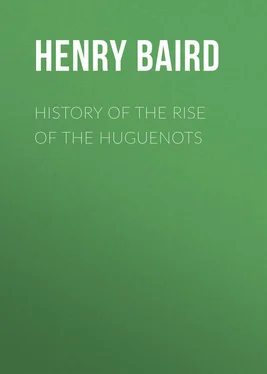Henry Baird - History of the Rise of the Huguenots
Здесь есть возможность читать онлайн «Henry Baird - History of the Rise of the Huguenots» — ознакомительный отрывок электронной книги совершенно бесплатно, а после прочтения отрывка купить полную версию. В некоторых случаях можно слушать аудио, скачать через торрент в формате fb2 и присутствует краткое содержание. ISBN: , Жанр: foreign_antique, foreign_prose, на английском языке. Описание произведения, (предисловие) а так же отзывы посетителей доступны на портале библиотеки ЛибКат.
- Название:History of the Rise of the Huguenots
- Автор:
- Жанр:
- Год:неизвестен
- ISBN:http://www.gutenberg.org/ebooks/30708
- Рейтинг книги:4 / 5. Голосов: 1
-
Избранное:Добавить в избранное
- Отзывы:
-
Ваша оценка:
- 80
- 1
- 2
- 3
- 4
- 5
History of the Rise of the Huguenots: краткое содержание, описание и аннотация
Предлагаем к чтению аннотацию, описание, краткое содержание или предисловие (зависит от того, что написал сам автор книги «History of the Rise of the Huguenots»). Если вы не нашли необходимую информацию о книге — напишите в комментариях, мы постараемся отыскать её.
History of the Rise of the Huguenots — читать онлайн ознакомительный отрывок
Ниже представлен текст книги, разбитый по страницам. Система сохранения места последней прочитанной страницы, позволяет с удобством читать онлайн бесплатно книгу «History of the Rise of the Huguenots», без необходимости каждый раз заново искать на чём Вы остановились. Поставьте закладку, и сможете в любой момент перейти на страницу, на которой закончили чтение.
Интервал:
Закладка:
404
The edict, of course, is not to be found in Isambert, or any other collection of French laws; but a letter in Lestoile (ed. Michaud, p. 19), to whom we are indebted for most of our knowledge of the event, refers to the very wording of the document ("ce sont les mots de l'édict"). The letter is entitled "Mémoire d'un différend meu à Moulins en 1566, entre le Cardinal de Lorraine et le Chancellier de l'Hôpital," and begins with the words: "Je vous advise que du jour d'hier ," etc. M. Bonnet has discovered and published, in the Bulletin de la Soc. de l'hist. du prot. franç., xxiv. (1875) 412-415, a second and fuller account, dated Moulins, March 16, 1566 (MS. French Nat. Library, Dupuy, t. lxxxvi., f. 158). As was seen above (p. 155), this altercation has been generally confounded with that of two years earlier. The letter given by Lestoile (see above) is also published in Mém. de Condé, v. 50, but is referred to the wrong event by the editor. Prof. Soldan (Gesch. des Prot. in Fr., ii. 199), follows the Mém. de Condé in the reference.
405
Not many months before this occurrence a guest at the Prince of Orange's table told Montigny that there were no Huguenots in Burgundy – meaning the Spanish part, or Franche-Comté. "If so," replied the unfortunate nobleman, "the Burgundians cannot be men of intelligence, since those who have much mind for the most part are Huguenots;" a saying which, reported to Philip, no doubt made a deep impression on his bigoted soul. Pap. d'état du card. de Granvelle, vii. 187, 188. The Burgundians of France were equally intolerant of the reformed doctrines.
406
"Je ne suis venu pour troubler; mais pour empescher que ne troubliez, comme avez faict par le passé, belistre que vous estes." Lestoile and Mém. de Condé, ubi supra .
407
See Prescott, Philip II., and Motley, Rise of the Dutch Republic.
408
M. Charles L. Frossard, of Lille, discovered the MSS. on which the following account is wholly based, in the Archives of the Department du Nord, preserved in that city. As these papers appear to have been inedited, and are referred to, so far as I can learn, by no previous historian, I have deemed it proper to deviate from the rule to which I have ordinarily adhered, of relating in detail only those events that occurred within the ancient limits of the kingdom of France. However, the reformation at Cateau-Cambrésis received its first impulses from France. Mr. Frossard communicated the papers to the Bulletin de la Société de l'histoire du protestantisme français, iii. (1854), 255-264, 396-417, 525-538. They are of unimpeachable accuracy and authenticity.
409
Lille MSS., ubi supra , 403.
410
"De sorte qu'ils espèrent que lesdits de la requeste et du compromis les adsisteront suyvant leur promesse, à ce qu'ils puissent jouyr de la mesme liberté accordez à Bruxelles, asçavoir, que l'exercise de la religion aye lieu par tout où il a esté usité auparavant, comme ceulx du Chastel en Cambrésis ont eue aussy, et ce seulement par manière de provision, jusques à ce que aultrement il y soict pourveu par le Roy avec l'advis des estatz, estimans que le Roy ne souffrira rien en son pays qui ne soict conforme ausdites ordonnances de l'empire." Lille MSS., ubi supra .
411
Letter of P. de Montmorency, Sept. 11, 1566, Lille MSS., ubi supra .
412
Motley, Dutch Republic, i. 458-462.
413
Lille MSS., ubi supra .
414
Mémoires de Claude Haton, i. 416, 417.
415
The satirical literature of the period would of itself fill a volume. The Huguenot songs in derision of the mass are particularly caustic. See M. Bordier, Le Chansonnier Huguenot, and the note to the last chapter. The Bulletin de la Soc. de l'hist. du prot. franç., x. (1861), 40, reprints a "dizain" commencing —
"Nostre curé est un fin boulanger,
Qui en son art est sage et bien appris:
Il vend bien cher son petit pain léger,
Combien qu'il ait le froment à bon prix."
416
"Chose indigne d'un prince tel qu'il se disoit." Journal d'un curé ligueur (Jehan de la Fosse), 73.
417
See the moderate account of the dispassionate Roman Catholic De Thou, iii. (liv. xxxix.) 666-670. Also Agrippa d'Aubigné, liv. iv., c. vi. (i. 208), and Discours des troubles advenus en la ville de Pamiers, le 5 juin 1566, Archives curieuses (Cimber et Danjou), vi. 309-343. The massacre of Protestants at Foix was caused by an exaggerated and false account of the commotion at Pamiers, carried thither by a fugitive Augustinian monk.
418
The good policy of straightforward dealing on the part of an ambassador is set forth in a noble letter of Morvilliers, Bishop of Orleans, from which I permit myself to quote a few sentences: "Il y en a toutesfois qui pensent que, pour estre habille homme, il fault tousjours aller masqué, laquelle opinion j'estime du tout erronée, et celluy qui la suit grandement dêceu. Le temps m'a donné quelque expérience des choses; mais je n'ay jamais veu homme, suivant ces chemins obliques, qui n'ait embrouillé les affaires de son maistre, et, luy, perdre beaucoup plus qu'acquérir de réputation; et au contraire ceux, qui se sont conduits prudemment avec la verité, avoir, pour le moins, rapporté de leur négotiation ce fruict et l'honneur d'y avoir faict ce que les hommes, avec le sens et jugement humain, peuvent faire." Correspondance diplomatique de Bertrand de Salignac de la Mothe Fénélon, vii. 97.
419
Journal de Jehan de la Fosse, 79, 80; Vie de Coligny (Cologne, 1686), 321-323; Gasparis Colinii Vita, 1575, 55; Agrippa d'Aubigné, Hist. univ., 1, 207.
420
Journal d'un curé ligueur (Jehan de la Fosse), 81.
421
"December (1566.) Au commencement vinrent plusieurs ambassades à Paris, tant de la part de l'Empereur, que du Pape, que du roy d'Espagne, lesquels mandèrent au roy de France, qu'il eust à faire casser l'esdict de janvier, ou autrement qu'ils se déclareroient ennemys." Ibid., 80. The fanatical party affected to regard the Edict of Amboise, March, 1563, as a mere re-establishment of the edict of January 17, 1562.
422
Mémoires de Castelnau, liv. vi., c. ii. Castelnau was certainly in a favorable position for learning the truth respecting these matters; and yet even he speaks of the "holy league," formed at Bayonne, as of something beyond controversy. According to a treaty and renewal of alliance between Charles the Ninth and the Roman Catholic cantons of Switzerland, entered into Dec. 7, 1564, for Charles's lifetime, and seven years beyond, the Swiss were to furnish him, when attacked, not less than six nor more than sixteen thousand men for the entire war. The success of the negotiation occasioned great rejoicing at Paris, and corresponding annoyance in the Spanish dominions. Du Mont, Corps diplomatique, v. 129-131; Jehan de la Fosse, 70; Papiers d'état du card. de Granvelle, viii. 599.
423
Mém. de Fr. de la Noue, c. xi.
424
He did more than this, according to the belief of the times, as expressed by Jean de Serres; for, "having been present at the Bayonne affair," he brought him irrefragable proof of the "holy league entered into by the kings of France and Spain for the ruin of the religion." Comment. de statu. rel. et reip., iii. 126.
Читать дальшеИнтервал:
Закладка:
Похожие книги на «History of the Rise of the Huguenots»
Представляем Вашему вниманию похожие книги на «History of the Rise of the Huguenots» списком для выбора. Мы отобрали схожую по названию и смыслу литературу в надежде предоставить читателям больше вариантов отыскать новые, интересные, ещё непрочитанные произведения.
Обсуждение, отзывы о книге «History of the Rise of the Huguenots» и просто собственные мнения читателей. Оставьте ваши комментарии, напишите, что Вы думаете о произведении, его смысле или главных героях. Укажите что конкретно понравилось, а что нет, и почему Вы так считаете.












